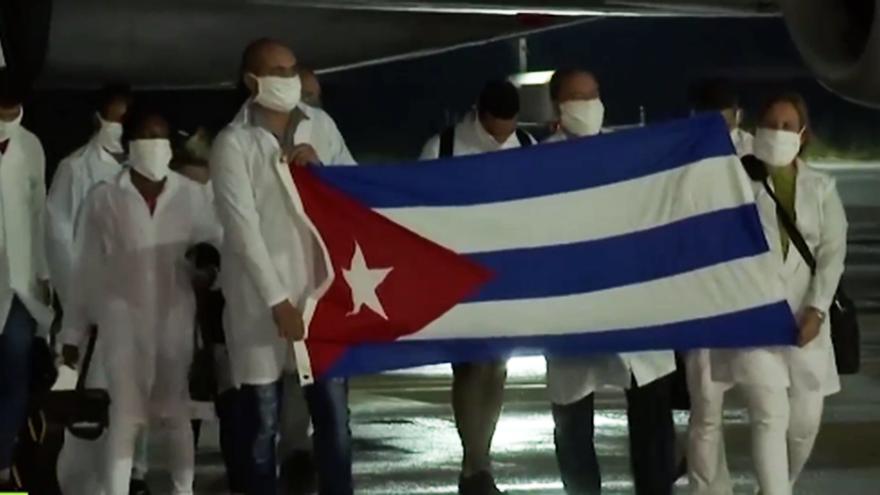
![]() The South African Democratic Alliance, in opposition, estimates the money invested in paying the salaries of Cuban doctors with expired contracts who continue in the province of Gauteng (which is home to the two largest cities of the country, Pretoria and Johannesburg) at almost 2 million dollars, while some local healthcare workers are unpaid.
The South African Democratic Alliance, in opposition, estimates the money invested in paying the salaries of Cuban doctors with expired contracts who continue in the province of Gauteng (which is home to the two largest cities of the country, Pretoria and Johannesburg) at almost 2 million dollars, while some local healthcare workers are unpaid.
The opponent Jack Bloom, from the provincial Health area, denounced that there are vacancies not filled with South African doctors while 14 Cuban doctors continue to earn between 78,000 and 91,000 rand per month, the equivalent of between 5,000 and 6,000 dollars. Meanwhile, there are 10 interns at Chris Hani-Baragwanath Academic Hospital who are “suffering” because they haven’t been paid this year.
“They do invaluable work on 12-hour shifts, but things are getting desperate as some of them are starving and don’t have money for transportation,” Bloom said.
The aforementioned Cuban doctors are part of a group of 28 whose contracts are not related to the special ones for covid-19, but to the agreements between the two countries signed in 1996. In this case, their contracts ended in May 2020, but Bloom denounces that half are still employed without any possible justification.
“It’s disappointing that the province still employs 14 of them when the local doctors are unemployed. I don’t see them doing anything the local doctors can’t do,” he said. The politician denounced that many of them do not even speak English well and are not familiar with the health problems in the area.
But Nomathemba Mokgethi, head of the regional health department, defended the measure. “Cuba as a country is known for having the best results in this area and its experience in prevention and health promotion helps strengthen the district system,” she said.
“Cuban doctors also serve as mentors and trainers for doctors who are located in primary health care centers, especially South African doctors trained in Cuba,” she alleges.
Bloom, on the other hand, sees shadowy interests in the maintenance of Cuban physicians. “It’s not a surprise, but there is something deeply suspicious about this because we have unemployed local doctors and unfilled medical positions,” he warned. In addition, the opponent said that at the end of the month health workers who were hired to attend to the pandemic will be laid off, so there will be vacancies.
The opposition has spent months focusing on the importing of Cuban doctors into the country, a task that entails a high cost because, in addition to salaries, it implies providing the health workers with accommodation, transportation and maintenance, costs which would not exist in the case of hiring to nationals.
The contingent of doctors who arrived in South Africa during the pandemic cost at least $6 million, which was justified at the time by having “limited” experience in the country. Those contracts were renewed twice. The tasks they carried out, according to the Cuba’s State-run Granma newspaper itself, were taking samples for PCR tests for Covid and contact investigations, a task that could have been carried out by nursing assistants, pharmacists or trained administrative personnel, but which, in the case of the Cuban doctors, cost almost 14 million dollars.
Relations between Cuba and South Africa are a source of frequent controversy. In addition to the conflict ridden contracts with doctors, the South African scholarship holders who study on the island have also been in the eye of the hurricane, recently due a party that the South African students were celebrating in Villa Clara, which ended with the Cuban police beating the medical students. Although the South African Government stated that it would ask for explanations, the issue has dissolved like a sugar cube in cup of coffee.
Other problems have arisen from agreements with Cuban engineers who come to South Africa to share their sanitation knowledge. The opposition has repeatedly denounced that, instead of focusing on local hiring, these workers are being brought in who are not even legally authorized to do a good number of tasks.
The scandal of the South African purchase of interferon alpha 2b from Cuba through the Ministry of Defense, in what was an operation not authorized by the Health Department, remains unresolved, but millions were invested in acquiring medicines that had to be returned or destroyed for the most part.
The most recent controversy between the two countries is the approval of a $3.25 million donation to Cuba to improve its “food security.” The authorities consider that it is necessary to support the island in the face of the US embargo with this economic aid since Havana supported them in their fight against apartheid, but experts and the opposition consider that collaboration due to an historical event is already excessive and it can become corruption.
____________
COLLABORATE WITH OUR WORK: The 14ymedio team is committed to practicing serious journalism that reflects Cuba’s reality in all its depth. Thank you for joining us on this long journey. We invite you to continue supporting us by becoming a member of 14ymedio now. Together we can continue transforming journalism in Cuba.
